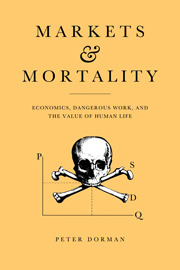Book contents
- Frontmatter
- Contents
- Preface
- Prologue
- 1 The economics of risk and the risk of economics
- 2 The theory of compensating wage differentials
- 3 Putting a value on human life
- 4 The real world of occupational safety and health
- 5 Alternative theories of risk, wages, and the labor market
- 6 New policies to promote safety and equity in the workplace
- Epilogue
- Notes
- References
- Index
2 - The theory of compensating wage differentials
Published online by Cambridge University Press: 04 May 2010
- Frontmatter
- Contents
- Preface
- Prologue
- 1 The economics of risk and the risk of economics
- 2 The theory of compensating wage differentials
- 3 Putting a value on human life
- 4 The real world of occupational safety and health
- 5 Alternative theories of risk, wages, and the labor market
- 6 New policies to promote safety and equity in the workplace
- Epilogue
- Notes
- References
- Index
Summary
For Adam Smith, the theory of compensating wage differentials was little more than common sense, so he did not take much time to justify or support it. Modern economics, however, has no place for such casual attitudes and, like other theories inherited from the past, wage compensation has been transformed from a plausible insight into a necessary deduction from a tightly reasoned model. But the formalization of economic theory has not only had the effect of giving it greater credence (in the eyes of economists); it has made it easier to apply in empirical work, since the relationships that need to be measured, such as ceteris paribus wage compensation, can now be specified precisely. It is not enough, then, to scan the surface of this (or any other) branch of modern economics. Its mathematical expression is no longer simply a translation of its narrative meaning: it now forms the substance of the theory and determines its strengths and weaknesses. In this chapter I will begin with a brief overview of the historical debate over compensating differentials and then move directly into a streamlined version of the basic formal model. After considering the structure of this model and drawing out its key implications, I will explore some of the ways economists have tried to reintroduce a measure of realism into their analysis.
An old debate
Adam Smith's claim that workers in a competitive labor market would receive compensating wage differentials for all disagreeable aspects of their jobs, including the risk of injury or death, was an instant hit in England.
- Type
- Chapter
- Information
- Markets and MortalityEconomics, Dangerous Work, and the Value of Human Life, pp. 32 - 50Publisher: Cambridge University PressPrint publication year: 1996



